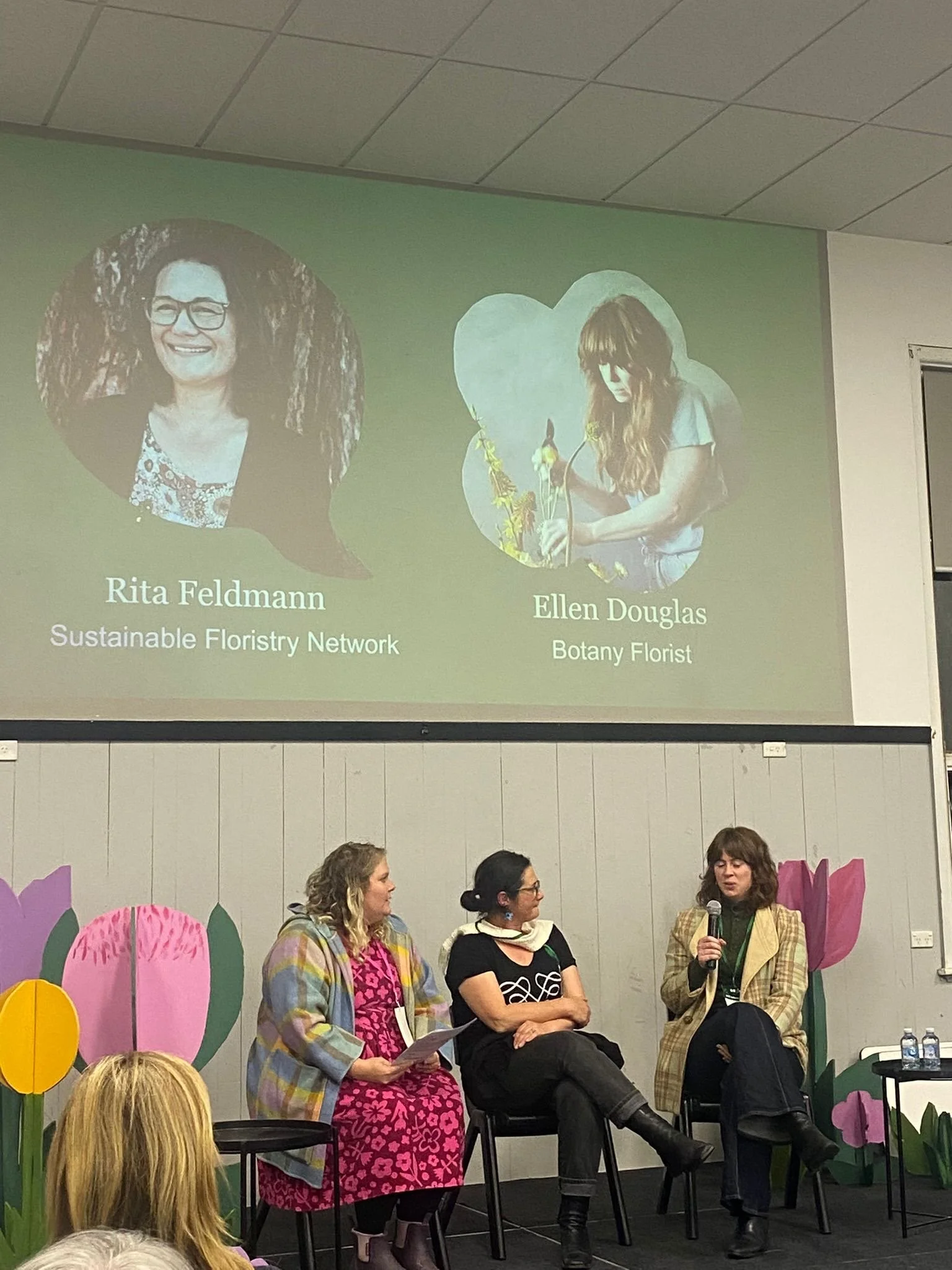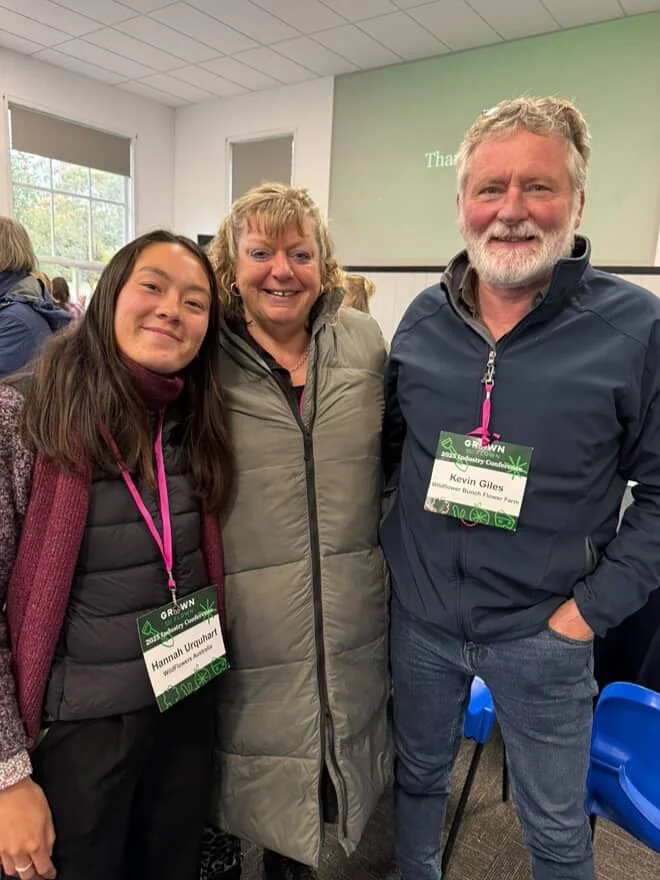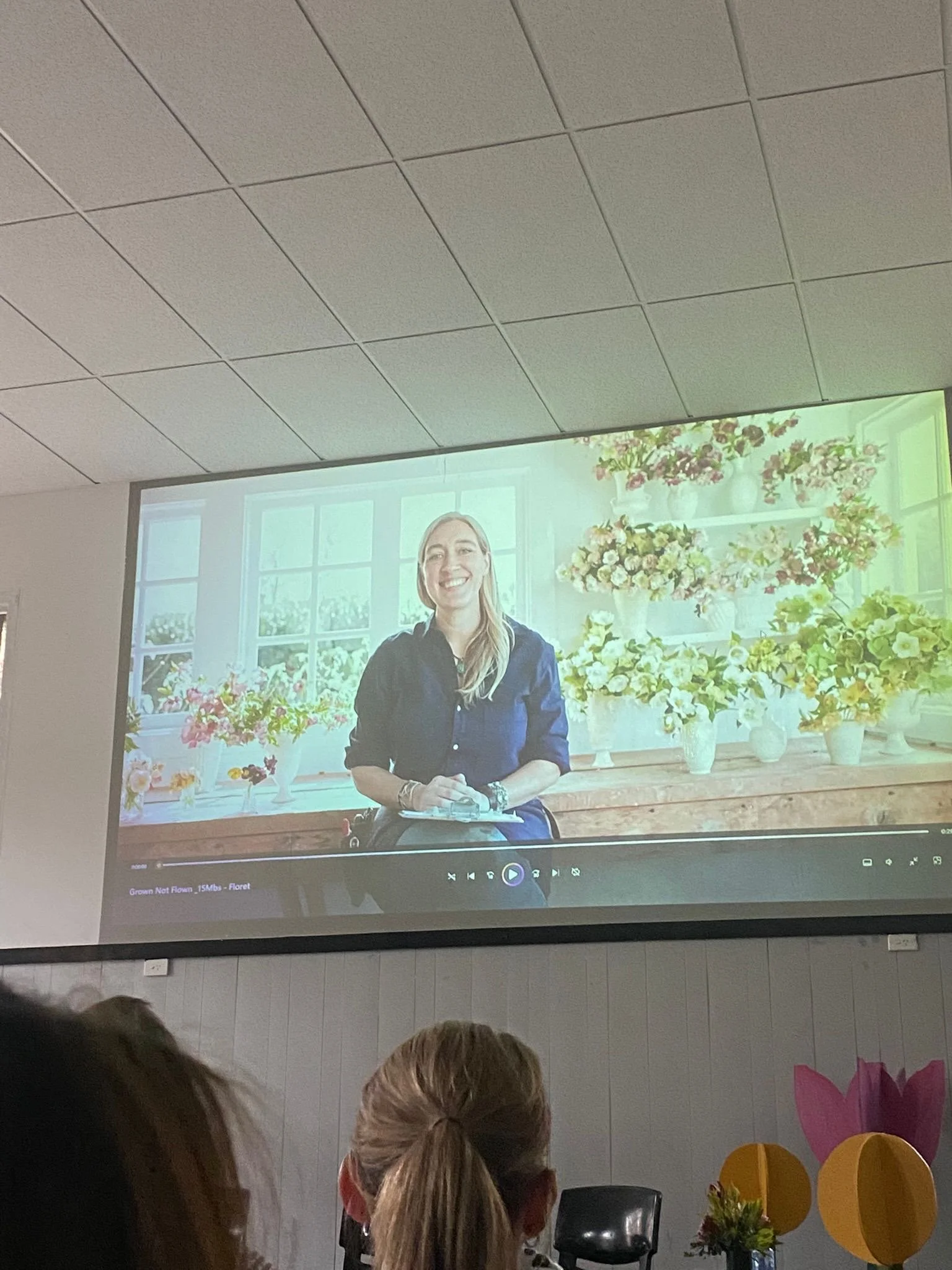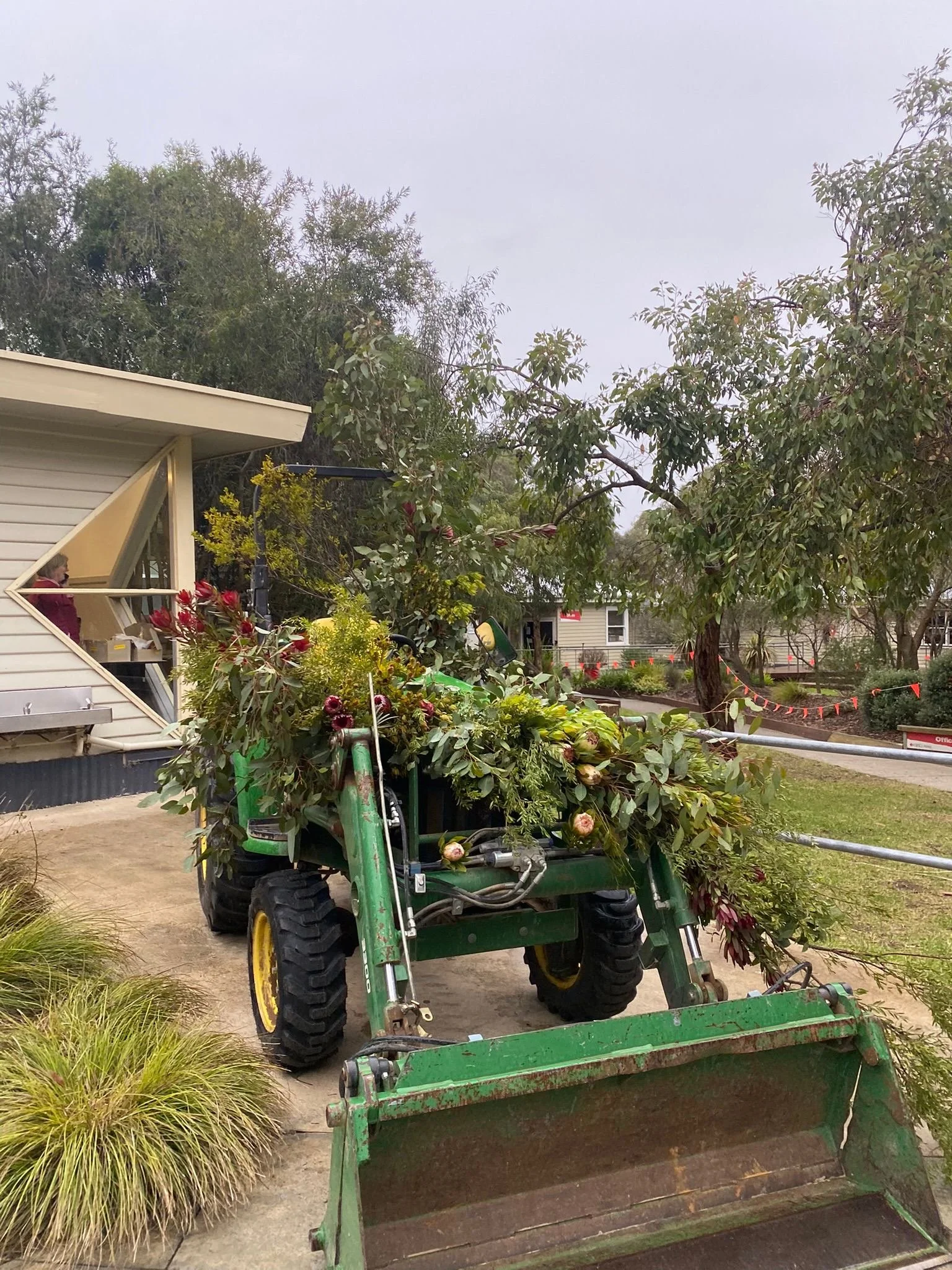Grown not Flown Conference
Saturday 7th & Sunday 8th June, 2025
Summary
The conference showed strong themes surrounding the importance of community in the cut flower industry. It highlighted the way in which engaging with other growers, florists and industry members can be beneficial in so many ways, allowing increased awareness of industry issues, providing a platform for sharing knowledge and ideas, and the opportunity to meet others who are doing both similar and different things within the industry. This event served as a noteworthy reminder to make efforts to attend industry conferences and events, as you are always left feeling inspired.
Day 1
Building a Sustainable Business: Julie Cameron, Meredith Dairy
Meredith Dairy began 34 years ago and has been built into an impressive business with products now found across Australia, as well as in more than 20 different countries.
Julie placed emphasis on the concept of adversity, and how crucial it is to find a better solution and enact change within a business. Meredith Dairy began as a Merino wool farm, and after the crash of the Australian Wool Reserve Price Scheme only a few years into the beginning of their business, they were forced to consider other options. They realised that goat and sheep cheese jarred in olive oil was a market through which they could not only dictate the price of their product, but also value add, and began pursuing this new idea. Shelf life was one of the main reasons for the success of their product, but evidently the business flourished as a result of their strategic planning and decision-making skills.
Julie spoke of Meredith Dairy’s vision for the ‘infinite game,’ which places consideration on future generations of the business. Their current production factory can produce 25 000 jars of cheese daily, and is powered by their own 100 kilowatts solar farm. Green energy is supplied through the use of a wood fired boiler, that utilises recycled woodchips to generate around 70% of the site’s heat. Additionally, each year they plant thousands of trees to support local ecosystems.
Irrigation 101: Alice Barry, Ultimate Pumps & Irrigation
Ultimate Pumps & Irrigation are a Ballarat based business that advise on irrigation for Nikki and Sam at Duck Duck Pig, as well as many other horticultural businesses in the area.
In this session, Alice discussed a dripline tube node system that can be attached to 4 solenoids, and can be controlled by a phone app. She further explained how frost protection sprinklers can be installed to achieve an extended growing season, through an automated system that can be programmed to kick in around 0.5-1℃.
Farm Safety & Mental Health: Panel discussion with Grace Larson, The Sisterhood Project, Paul Wearing, Victorian Farmers Federation, and Sarah Duncanson, PAEDS Education
Safety is often an aspect that is overlooked by small farms and businesses. This panel discussion called attention to the necessity of assessing the risks within your business, and the importance of community within the web of physical and mental health. Speakers encouraged growers to get educated on first aid and related courses, and to get comfortable with educating your children, and even your grandchildren.
Safety apps to consider downloading on your phone: Emergency Plus, Australian Bites & Stings.
From Seed to Success: Online pre-recorded session with Erin Benzakein, Floret Flowers
Erin Benzakein is often viewed globally as the face of micro-scale cut flower growing, acting as a researcher, educator, writer, and advocator for locally and sustainably grown flowers.
Erin spoke of her humble beginnings selling mixed bunches, and how she spent time purchasing bouquets from different grocery stores and pulling them apart. She would contemplate which aspects she did and did not like, and analysed every detail from the way that the paper was folded around the bouquet, to the number of stems of flowers/foliage and the types of flowers used. She recommends trying as many different pathways within the industry to figure out which avenue you want to specialise in.
She highlighted the way in which learning and practicing being on both sides of a camera and in videos can be a game changer for your business, encouraging growers to show up and showcase who is growing the flowers, and not just where they are grown. Erin’s final message placed emphasis on fostering community within the industry, noting that we are all connected and should be allies, and that we are stronger together, not divided.
Connecting with your Customers: Panel with Mardi Rhoden, Quite Contrary Flower Farm, Vivien Hollingsworth, Studio Hollingsworth, and Amanda Flynn, Smellies Botanical Design
This panel explored the role of communication in creating solid relationships between growers and florists, as well as the challenges of dealing with difficult customers.
Soil Health & Resilience in the Face of a Changing Climate: Dr Mary Cole, AgPath
Dr Mary Cole is a plant pathologist and soil microbiologist who specialises in consulting in sustainable biological agricultural practices, that are non-chemical and synthetic fertiliser based. She highlighted that Australia loses 2 billion tonnes of topsoil as a result of Australian agriculture, annually, and that ploughing fields and growing monocultures is leading to a loss of biological activity. Dr Mary Cole’s unconventional practices have proven to generate some incredible success stories where input costs have been lowered, yet yields have been notably increased, and she encourages growers to consider using biological practices to unlock new potential in growing systems.
Dr Mary Cole emphasizes the importance of understanding your soil bacteria to fungi ratio, which reflects the level of activity within soils, ultimately driving the chemical processes that occur. This ratio influences what plants are more likely to germinate and grow. Weeds occur as a result of bacterial dominated soil, rather than fungal dominated soil. Consider making efforts to increase soil fungal populations, by applying amendments such as compost, mulch, compost tea, fish and kelp hydrolysates, or low Sulphur molasses. Mycorrhizal spores can also be purchased, but ensure you buy a diverse mix that has at least 6 or so different strains. Avoid using lime as it only temporarily changes pH, and is capable of killing microbiology and creating toxicity within soils. Alternatively, apply rock dust in the form of granite or basalt.
Evening Session on Sustainability: Rita Feldmann, Sustainable Floristry Network, and Ellen Douglas, Botany Florist
Rita Feldman is the founder and director of Sustainable Floristry Network and a regular contributor to Flowers Magazine. She proudly preaches the use of sustainable practices that avoid floral foam, a non biodegradable product that is sadly still used by a large portion of the industry. Her efforts to educate others about the dangers of floral foam as a microplastic that toxifies soils and water systems have supported the ban of floral foam in the Chelsea Flower Show since 2021. Similarly, Ellen Douglas practices sustainability at the core of her business, and together, they share a love for seasonal, Australian grown flowers, that avoid the carbon and chemical footprint of imported flowers.
Locally grown flowers have around 1/10th of the footprint of those that are imported or grown in heated greenhouses. Educating both florists and consumers plays such a key role in sustainability moving forward- some consumers are still shocked when they are told that the flowers they are buying are imported. Ultimately, each part of the chain of production from growing flowers to receiving them as a gift, is involved in making conscious decisions to support sustainable practices. For an industry that celebrates nature, sustainability must be at the core of all practices to ensure long-term sustainability of both the industry, and the land we live on.
Day 2
Pricing for Flower Farmers: Online pre-recorded session with Georgie Newbery, Common Farm Flowers
Georgie encourages new full time growers to start by working out how much your life costs to live, and then planning your business around making this amount. She recommends taking pro bono work that may be both enjoyable and good for your reputation, as long as it is not too expensive. Overall, she insists that growers should take more time to consider each decision they make, and to keep learning, planning and evolving.
Landcare Tour: Roger MacRaild, Moorabool Landcare Network
In this session, Roger spoke about the various practices utilised by landcare groups to monitor local flora and fauna populations, and the importance of community involvement in projects involved in eradicating invasive species.
Telling your Story & Social Media: Kimberley Furness, OAK Magazine
People don’t buy products, they buy stories. In this session, Kimberley spoke about how your story can be told in 3 ways- personal (why do you care?), practical (what problem are you solving?) and purposeful (what change do you want to make?). She delved into important factors to consider when putting together social media posts, including the use of keywords, creating a consistent and recognisable image across all platforms, using paragraphs to add white space in captions, and finishing captions with a call of action.
Work Smarter, Grow Stronger: Nikki Davey, Grown not Flown & Duck Duck Pig
The conference came to an end with Nikki Davey speaking, Grown not Flown co-founder and AgriFuture’s Rural Women’s Award winner in 2023. She recently released her first book on business on Amazon, The Pie gets Bigger- Complementors over Competitors. Nikki wrapped up the conference with inspiring words on strategy, communication and the use of data as a competitive advantage. Her final words called attention to the importance of taking action.



